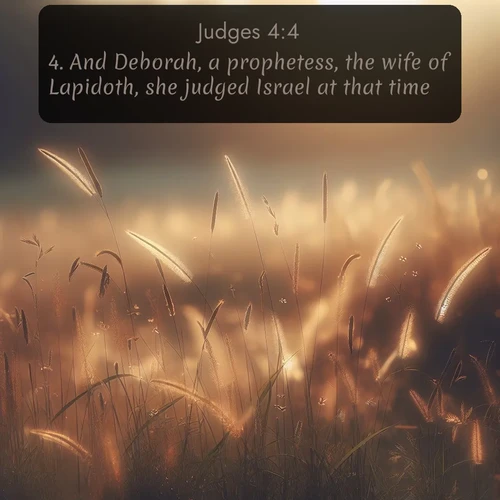Judges 4:4 plusieurs versions / traductions
English Bible Translations
4. And Deborah, a prophetess, the wife of Lapidoth, she judged Israel at that time.
4. Now Deborah, a prophetess, the wife of Lappidoth, she judged Israel at that time.
4. Now Deborah, a woman prophet, the wife of Lapidoth, was judge of Israel at that time.
4. And Deborah, a prophetess, the wife of Lapidoth, she judged Israel at that time.
4. And Deborah, a woman inspired, wife of Lapidoth, she is judging Israel at that time,
German Bible Translations
4. Zu der Zeit war Richterin in Israel die Prophetin Debora, das Weib Lapidoths. {~}
4. Debora, eine Prophetin, das Weib Lapidots, richtete Israel zu jener Zeit.
French Bible Translations
4. A cette époque, Débora, une prophétesse mariée à un certain Lappidoth, était juge en Israël.
4. Dans ce temps-là, Débora, prophétesse, femme de Lappidoth, était juge en Israël.
4. Dans ce temps-là, Débora, prophétesse, femme de Lappidoth, était juge en Israël.
4. Et Debora, une prophétesse, femme de Lappidoth, jugeait Israël en ce temps-là.
Versions with Strong Codes
Judges 4 / KJV_Strong4. And Deborah,[H1683] a prophetess,[H5031] [H802] the wife[H802] of Lapidoth,[H3941] she[H1931] judged[H8199] [H853] Israel[H3478] at that[H1931] time.[H6256]
Strong Code definitions
H1683 Dbowrah deb-o-raw' or (shortened) Dborah {deb-o-raw'}; the same as H1682; Deborah, the name of two Hebrewesses:--Deborah. see H1682
H5031 nbiy'ah neb-ee-yaw' feminine of H5030; a prophetess or (generally) inspired woman; by implication, a poetess; by association a prophet'swife:--prophetess. see H5030
H802 'ishshah ish-shaw' feminine of H376 or 582; irregular plural, nashiym{naw-sheem'}; a woman (used in the same wide sense as H582):--(adulter)ess, each, every, female, X many, + none, one, + together, wife, woman. Often unexpressed in English. see H376see H582&volume=KJV_strong' target='_self' >H582 see H582&volume=KJV_strong' target='_self' >H582
H802 'ishshah ish-shaw' feminine of H376 or 582; irregular plural, nashiym{naw-sheem'}; a woman (used in the same wide sense as H582):--(adulter)ess, each, every, female, X many, + none, one, + together, wife, woman. Often unexpressed in English. see H376see H582&volume=KJV_strong' target='_self' >H582 see H582&volume=KJV_strong' target='_self' >H582
H3941 Lappiydowth lap-pee-doth' feminine plural of H3940; Lappidoth, the husband of Deborah:--Lappidoth.see H3940
H1931 huw' hoo of which the feminine (beyond the Pentateuch) is hiyw {he}; a primitive word, the third person pronoun singular, he (she or it); only expressed when emphatic or without a verb; also (intensively) self, or (especially with the article) the same; sometimes (as demonstrative) this or that; occasionally (instead of copula) as or are:--he, as for her, him(-self),it, the same, she (herself), such, that (...it), these, they, this, those, which (is), who.
H8199 shaphat shaw-fat' a primitive root; to judge, i.e. pronounce sentence (for or against); by implication, to vindicate or punish; by extenssion, to govern; passively, to litigate (literally or figuratively):--+ avenge, X that condemn, contend, defend, execute (judgment), (be a) judge(-ment), X needs, plead, reason, rule.
H853 'eth ayth apparent contracted from H226 in the demonstrative sense of entity; properly, self (but generally used to point out more definitely the object of a verb or preposition, even or namely):--(as such unrepresented in English). see H226
H3478 Yisra'el yis-raw-ale' from H8280 and 410; he will rule as God; Jisrael, a symbolical name of Jacob; also (typically) of his posterity:--Israel.see H8280 see H410
H1931 huw' hoo of which the feminine (beyond the Pentateuch) is hiyw {he}; a primitive word, the third person pronoun singular, he (she or it); only expressed when emphatic or without a verb; also (intensively) self, or (especially with the article) the same; sometimes (as demonstrative) this or that; occasionally (instead of copula) as or are:--he, as for her, him(-self),it, the same, she (herself), such, that (...it), these, they, this, those, which (is), who.
H6256 `eth ayth from H5703; time, especially (adverb with preposition) now, when, etc.:--+ after, (al-)ways, X certain, + continually, + evening, long, (due) season, so (long) as, (even-, evening-, noon-)tide, ((meal-)), what) time, when.see H5703
Prédications qui analysent les thèmes Juges 4
Thèmes : Débora et Barak; Victoire sur Sisera; Chanson de DéboraRelated Sermons discussing Judges 4
Themes : Débora et Barak; Victoire sur Sisera; Chanson de Déborasee also: Bible Key Verses ; KJV Bible Images, BBE Bible images

